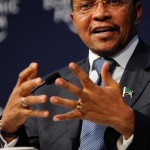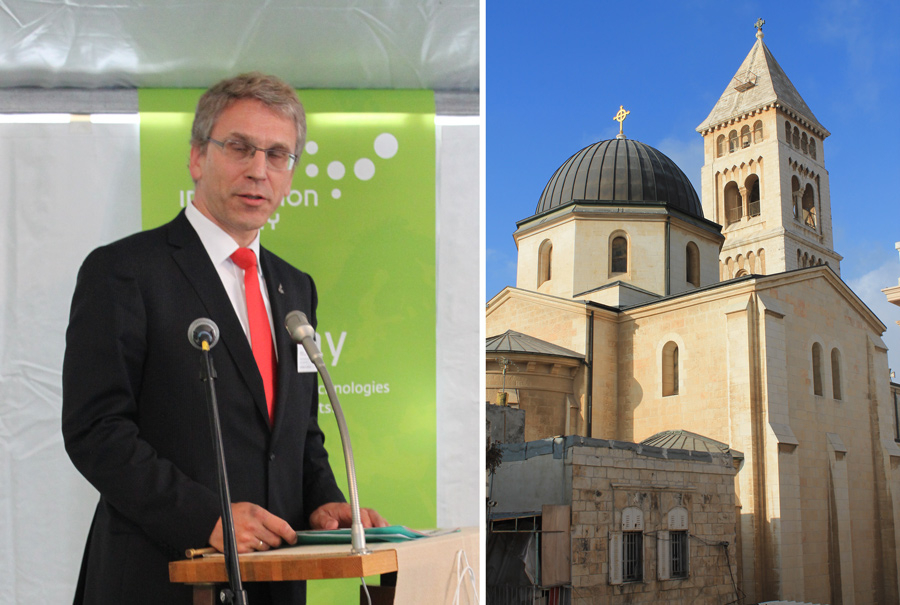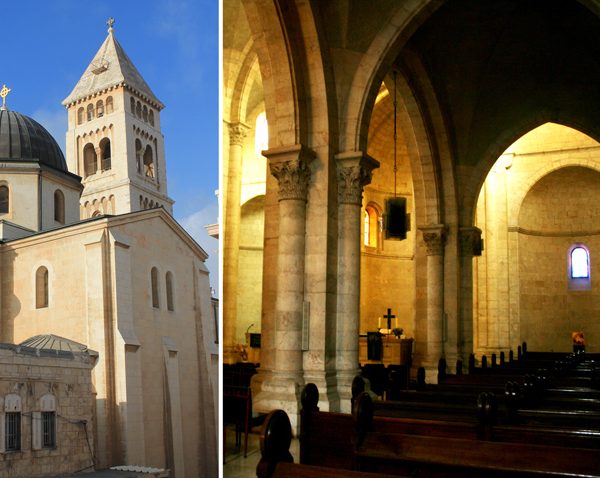Two recent Gatestone Institute articles were addressed to the current campaign of the World Council of Churches (WCC) called “Seven Weeks of Water 2016.” In response, the WCC has issued an open letter to Gatestone. This author is responsible only for what his article stated. Conversely, we can examine the WCC’s response exclusively as referring to that article.
The article concerned the “sermon” preached by the General Secretary of the World Council of Churches (WCC), Olav Fykse Tveit, when he launched the campaign in a Jerusalem church. The sermon can be downloaded from the WCC’s website.
From this viewpoint, the WCC’s open letter contains a plainly false statement. It says: “The information and statistics we employ in the campaign are derived from United Nations sources. None are from the Palestinian Water Authority.”
Read the sermon from beginning to end and back, and you will find only one reference to a United Nations source: that the World Health Organization (WHO) recommends 100 liters of water per day per person (a target that is missed in many parts of the world). Regarding Palestinian water, Tveit’s “information and statistics” are drawn, as the sermon explicitly says, from the “advocacy group of Palestine, EWASH” (that is, from the Palestinian website “Thirsting for justice”). So, contrary to what the open letter states, Tveit’s sermon, which constituted the opening statement of the campaign and sets the tone for whatever follows, is based on a source openly engaged in pro-Palestinian agitation.
The criticism in my article was addressed to what Tveit unhesitatingly accepted from that source. So note, too, that the open letter makes no attempt to answer, or even to mention, what that criticism was. How could it, since it alleges that Tveit’s sermon is part of a campaign that cites UN data alone?
Moreover, the web page of the campaign contains various “reflections” by Palestinian clerics and WCC employees in the same spirit as Tveit’s sermon. The contribution of Bishop Younan, for instance, makes the same claims about water as Tveit does. It is absurd to claim that the campaign is based exclusively, or even mainly, on UN sources.
The WCC does, however, have good reason for not attempting to deal with my criticism. It is that my criticism is so evidently correct, and Tveit’s claims are so lamentably wrong, that the WCC would make itself look absurd if it quoted the criticism and struggled to find any way around it.
To save the reader time, let us briefly review three main claims made by Tveit and why they are wrong.
First, Tveit claims that “80% of the ground water from Palestine’s mountain aquifer is pumped underneath all the way to Israel.” Likewise Younan: “80% of the water is pumped to Israelis.” You have to be a blind believer in Israeli iniquity not to notice that this statement is prima facie incredible. The suggestion is that Israel has created a network of pumps and pipelines that gather water from wherever it can be found and transfers it all to Israel. Of course, there is no such network.
The truth of the matter is that water falling in the hills, where the main Palestinian cities lie, goes underground, and some of it, thanks to the geology, emerges far away in Israel. This issue was addressed in the Oslo II agreement of 1995, where Israel committed itself to pump a fixed proportion of the estimated annual rainfall in the opposite direction: to connections with the water grid of the Palestinian Authority. So the only question is whether Israel has fulfilled that commitment. It has. That is the end of the matter. All claims that Israel “steals” Palestinian water are based on credulous ignorance or conscious dishonesty. [For more details, see “Palestinian Water (and Martin Schulz): The Lack of Logic“]
Second, Tveit claims that Palestinians enjoy less water per capita than Israelis. Here the point is that his figures may be true or false, but that per capita comparisons are anyway irrelevant. Israel’s obligation is based on the actual amount of rainfall. How much that works out to per capita depends upon how fast the Palestinian population grows, a factor for which the Palestinians themselves are solely responsible.
Third, Tveit complains that Israel strictly limits permits to sink wells in Area C of the West Bank. Why Israel is right to do so can be seen from the case of Gaza, where uncontrolled digging of wells has made the ground water undrinkable because the drop in the water level led to contamination by an inflow of sea water.
The proper form of response from the WCC would have been to write an open letter that first quoted the three points from my article, then answered them one by one. Such a letter, however, was impossible, because all three points are simply and obviously correct. Instead, the WCC wrote a letter that completely ignored Tveit’s mistakes and falsely claimed that he was using only United Nations sources, apparently trusting that then nobody would read the article itself.

The World Council of Churches (WCC) published an open letter to Gatestone Institute last week, concerning a pseudo-Christian political “sermon” given by WCC General Secretary Olav Fykse Tveit (pictured left) at the Lutheran Church of the Redeemer in Jerusalem (right). [Image source: Vidar Ellingsen/Innovasjon Norge (Tveit), Wikimedia Commons (Church)] |
The WCC makes much of how Palestinians are “thirsting for justice.” Only it has turned its eyes away from the thirst of Palestinians for justice from the Palestinian Authority (PA) itself. These very days, a Palestinian legislator, Najat Abu Bakr, sought refuge in the building of the Palestinian Legislative Council after PA President Mahmoud Abbas ordered her arrest. Her offence was to accuse one of Abbas’s ministers of — wait for it — stealing Palestinian water and selling it privately.
There have been various protests on her behalf, one of them in a Gatestone article by Israeli Arab writer Khaled Abu Toameh. If the WCC is truly thirsty for Palestinian water justice, why has it not rushed to the defense of Najat Abu Bakr?
The “open letter” of the WCC proposes the opening of a dialogue. What does that mean? If the WCC envisages a meeting of Palestinians and Israelis in which each participant mouths his or her “narrative,” then — first of all — it can hardly take place, since the Palestinians have imposed a ban on all such “normalization” of Israeli-Palestinian relations. They also impose sanctions upon any Palestinian who, nevertheless, ventures to talk with Israelis. Second, a “narrative” in that sense, as this author wrote elsewhere, is often “a pack of lies that demands immediate uncritical assent.” In a publicly staged debate of “narratives,” the one who shouts loudest walks away as the acclaimed victor, but neither truth nor justice is served.
Suppose, however, that the WCC wants to start a dialogue based on truth rather than “narratives.” Then there is a way for it to do so. It should send Gatestone a fresh open letter that includes the following three points:
- A statement that the WCC has removed from its website that section of Tveit’s sermon which was based on EWASH and that such allegations will no longer be part of Seven Weeks of Water 2016. The WCC will also have to withdraw the Order of Worship that it sent out. In this worship, hundreds of millions of Christians are requested to chant Israel’s guilt and the innocence of Palestinians, including the lie that “80% of the water is pumped to Israelis.”
- An admission that its original open letter was mistaken in claiming that Tveit’s sermon was based only on United Nations sources.
- A call for the persecution of Najat Abu Bakr to cease and for an impartial investigation of her claim that a Palestinian minister has been stealing Palestinian water. This call, the WCC should also promise, will be made part of Seven Weeks of Water 2016.
If the WCC can do those three things, then a dialogue based on truth, as opposed to “narratives,” could emerge.
Malcolm Lowe is a Welsh scholar specialized in Greek philosophy, the New Testament and interfaith relations.

































